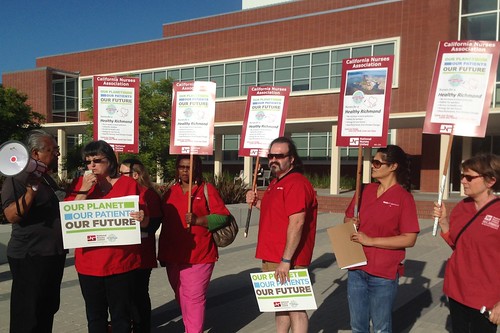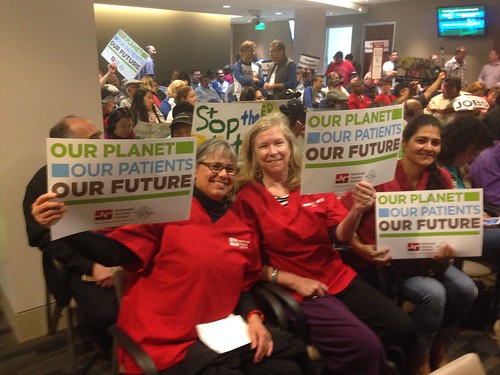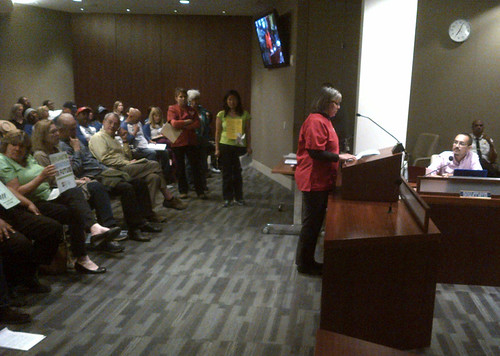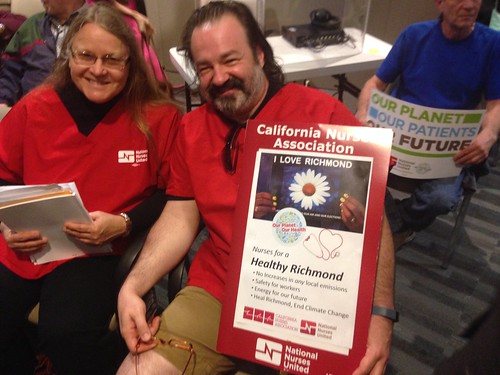However you celebrate your Easter this year, The Gypsy Nurse would like to wish you a very Happy Easter!
The post Happy Easter appeared first on The Gypsy Nurse.
However you celebrate your Easter this year, The Gypsy Nurse would like to wish you a very Happy Easter!
The post Happy Easter appeared first on The Gypsy Nurse.
By: DeAnn McEwen, RN
Power without Pollution! It’s not just a slogan, but an urgent call put forth by nurses who are committed to the health, well-being, and safety of our communities! A day after the nurses hosted a “Main Street Campaign Environmental Justice Workshop” at their headquaters in Oakland, they turned out in nearby Richmond, California at the Planning Commission hearing to bear witness to the life-threatening health impacts of Chevron’s planned expansion project of it’s coastal refinery.

RNs outside of Richmond, CA City Hall.
The Chevron project would send our community down the dangerous path to refining extreme fossil fuels and dirtier crude. In a community already facing increased rates of asthma, cancer, and low birth weight babies, this project will make our air quality more hazardous and our neighborhoods dumping grounds for even more toxic chemicals.
Soot pollution is a pervasive pollutant that has endangered our community and it remains a year-round threat to our health.

Nurses stand with Richmond, CA residents at refinery hearing in protest of Chevron expansioin plan.
As nurses we are particularly concerned about the disproportionate effects of toxic pollutants on the health of our community’s most vulnerable members. Children and infants are at greater risk due to their still developing lungs and respiratory systems. The elderly, and people with pre-existing respiratory and cardiovascular diseases, diabetes, and cancer all face greater risks than the general public. Low income and working families, because they are more likely to live near heavily traveled roadways and industrial districts also suffer more, when coupled with the fact that these families also are less likely to have adequate health care coverage and this creates a real crisis in our community.

Several RNs testified on the health impacts the Chevron refinery is having on Richmond communities.
Nurses are on the front lines of treating those who suffer from soot and other toxic pollutants released during drilling, fracking, pumping, transport and refining of crude oil. As the nation’s most ethical and trusted profession, nurses on a day-to-day basis how important pure water, fresh air, and clean soil is for children and families. You may not be a nurse, but you can join nurses to help prevent harm and relieve suffering. Ethically and morally, we know that if we can prevent harm, we have a duty to do so. Nurses stood united with other human rights and environmental justice groups to prevent the toxic expansion project from moving forward. Big oil and special interests should not be allowed to profit at our expense. We can create more jobs and healthier communities by investing in sustainable, renewable energy sources such as wind and solar power.

DeAnn McEwen seen left with fellow RN.
Many people thanked the nurses for advocating for their health and emphasized what a difference it makes to have nurses speaking to these issues. One woman who was hospitalized in the explosion said how heartened she was that nurses cared so much for the community. After the last of the public comments, the commissioners each took a turn making their own comments. Commissioner Martinez and Commissioner Reyes gave special thanks to the nurses of CNA for being present and shedding light on the health impacts. Both also referenced our RNs talking about the threatened Doctor’s Medical Center closure and made a point to say that the community needs to do something about it (one suggested that seeing as though Chevron sent 15,000 people to the ER in 2012 when the refinery exploded, perhaps Chevron should be required to fund the hospital to stay open as a condition of this project proposal).
###
DeAnn McEwen is a Registered Nurse and a Nursing Practice Specialist at the California Nurses Association/National Nurses United.
Ask a Travel Nurse Question:
In travel nursing, how do I know if I am being paid fairly?
Ask a Travel Nurse Answer:
I get a ton of emails asking this, but always feel a bit defensive of the profession of travel nursing when I respond. I suppose that is because I look back on a profession that has afforded me a great many adventures which would never have been possible for it not for travel nursing. I guess it’s kinda hard to bash anything when your first assignment is in Maui ![]()
But along those lines, let me ask you a simple question; “Do you feel you are being paid fairly?” I’ve written before that this may be a very “zen-like” way of looking at the world of travel (where nothing matters other than the enjoyment of the profession itself). But it is a question you really do have to ask yourself at some point because no matter what you are being paid, if you don’t feel fairly compensated for the work you do, then how good are you going to feel about it?
I also have to admit that I’m not really a traveler that cares what I am being paid as long as it is enough to pay my monthly bills (with some spending money left), give me a nice place to lay my head after work, and have health insurance. However, I do realize that there are those who have different priorities and money can certainly be at the forefront of those priorities.
The only way to truly know if you are being paid competitively is by comparing apples to apples on your travel assignment offerings. To do so accurately can be VERY difficult. While one company may offer a higher rate, another company may charge less for their health insurance, or have better housing, which then can negate the extra hourly. But if you are not concerned with having good healthcare coverage or staying in the nicest “digs”, then perhaps hourly rate is your only concern. If this is the case, then it becomes a bit easier because all you have to do is call several companies with which you are on file, and ask them the going rate for the area. Occasionally, you will find two or three companies with the same contract, often with a different hourly rate. It then becomes about the benefit(s) you favor most.
But, once again, if you are trying to balance the best of ALL the benefits your companies are offering, then it is tricky to have to try to weigh $2 more an hour against being put up in an extended stay hotel (verses a one bedroom apartment with the company paying less).
Try not to get caught up in the game of “what does your company pay you?” or you will always feel cheated. You can rarely know ALL the details of someone else’s contract. Call around when shopping a new assignment, weigh the benefits you feel are important, and go with a reputable company that will have your back should something go wrong on your assignment. A few dollars more an hour is NEVER worth it when your company hits you up for thousands of dollars on a contract cancellation due to no fault of your own.
I hope this helps.
David
At a time when there is a critical shortage of mental health services and more than 40,000 patients a year are boarding in our state’s hospital emergency …
Download the newsletter…
UMass Memorial Effort to Cut Services and Staff is Pennywise and Pound Foolish and Will Undermine the Quality and Safety of Patient Care
This morning we learne…
Click to view slideshow.
Imagine everyone in your town wanting to let you know you are awesome. MNA nurses in International Falls don’t have to dream.
Eight months into negotiating a contract with management at Rainy Lake Medical Center (RLMC), the 27-member bargaining unit is literally seeing signs of support throughout this picturesque city that shares a border with Canada.
Over 100 signs, sporting the message “We Support Our Nurses” are being posted in shop windows; hoisted high by firefighters, paramedics and EMTs; cradled by senior apartment residents; and displayed on bulletin boards throughout the city’s commercial districts. It’s a message warmly given from the town often referred to as “America’s Icebox.” In addition, members of several other unions in the area have signed petitions of solidarity for the nurses.
RLMC management has yet to receive the message. Contract talks on Tuesday ended after the union and hospital could not come to agreement settling outstanding proposals in negotiations.
A key issue is hospital management’s attempt to force a “management rights” clause into the next three-year contract. Nurses fear the provision could lead to administrative personnel perceiving they have power to make arbitrary decisions that impact nursing practice and patient safety.
A petition, signed by 100 percent of the nurses and delivered to management in February characterized, the tactic as a “serious overreach of authority.”
“When it comes to the care we are able to give and how we can advocate for our patients, this proposal ties our hands,” said MNA negotiating team member Diane Olek. She is especially concerned about the fast-changing dynamics of health care.“ This is a contract we will have to live with and health care is changing so quickly,” said Olek. She worries that non-providers believing they can arbitrarily make unilateral decisions about nurse staffing without negotiating them will compromise the safety of patients in the hospital. “Why lock ourselves into this?”
Lisa Hay, an active union member, considers it an unacceptable concession of rights and professional nursing judgment. At a recent all-RN meeting, Hay warned her colleagues “When I looked at the management rights clause I said ‘what you take away from us, you take away from patients’.”
Those values run through the whole nurse group. “I feel 100 percent support at the table,” said MNA Co-Chair Wendy Sutch. “All of our nurses feel very strongly they want to have a voice in patient care.” She describes her colleagues as a tight-knit group and especially sees a deep river of resolve in the younger nurses. “They’re aware of what their future could be based on this contract. Everyone’s on board.”
That solidarity and community support will be on full display for RLMC management to view on Tues., May 6 when MNA nurses intend to conduct an informational picket in front of the hospital from noon – 2:00 p.m.
…Can Be Made in All Hospital Clinical Areas with Expanded Measures